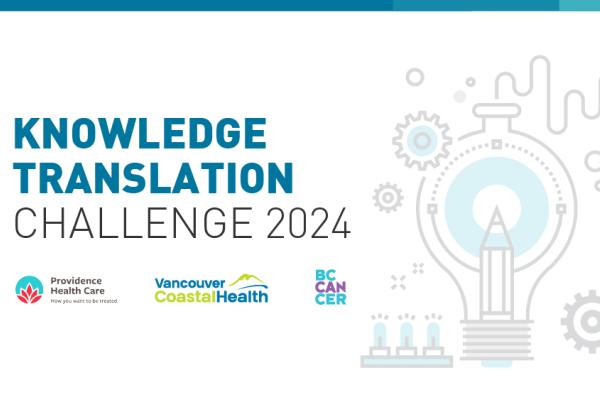
Congratulations to the 2019 VCHRI Team Grant recipients!
The entire health care system benefits when supportive and collaborative research thrives. Vancouver Coastal Health Research Institute (VCHRI) is proud to support research through Team Grant mentorships, which facilitate Vancouver Coastal Health (VCH) staff and clinicians teaming up with experienced researchers to exchange knowledge and build partnerships. These grants aim to improve the provision of health care by supporting collaborative applied research projects between research mentors and VCH health care providers.
The 2019 Team Grant recipients are:
- Nicole Cowan, clinical educator, Withdrawal Management Services
- Barbara Eddy, family nurse practitioner, Downtown Community Health Centre
- Dr. David Hall, head, Vancouver Department of Family and Community Practice, VCH; medical director, Regional HIV Program, VCH; clinical instructor, Department of Family Medicine, Faculty of Medicine, UBC
- Dr. Lillian Hung, clinical nurse specialist, Vancouver Coastal Health
- Dr. Amrish Joshi, community palliative physician, Richmond Integrated Hospice Palliative Care Program
- Dr. Kelly Smith, lead psychologist, BC Centre for Vulvar Health
- Dr. Marianna Leung, clinical pharmacy specialist, Kidney Transplant Program, St. Paul’s Hospital
Validating a withdrawal prediction tool for substance use care

Project title: A quantitative observational validation study of the modified prediction of alcohol severity scale in patients accessing substance use care at an inpatient medical withdrawal management centre
A lack of accurate alcohol withdrawal triage tools can lead to unnecessary admissions to acute and inpatient care and limited access to those settings for patients who really need them. The Prediction of Alcohol Withdrawal Severity Scale (PAWSS) has been validated as a screening tool for hospitalized patients who may be at risk for serve alcohol withdrawal syndrome. Use of the scale involves interviewing the patient about their consumption habits and assessing risk factors for withdrawal.
The Vancouver Detox Center has incorporated a modified version of the PAWSS (M/PAWSS) into practice. This project aims to determine if the M/PAWSS stands up against the original PAWSS as a reference standard.
“Better predicting the risk of severe alcohol withdrawal syndrome will optimize withdrawal management and substance use care for all patients, regardless of their level of need,” says Cowan. “It will facilitate proper access to primary care services for patients at low risk while increasing access to inpatient medical care for high risk patients.”
“Predicting risk informs program planning and allocation of resources to safely manage patient acuity and complexity.”
Examining a non-pharmacological intervention for chronic pain

Project title: Longitudinal analysis of an innovative non-pharmacological intervention for chronic pain in a marginalized population – a prospective pilot study of myoActivation®
British Columbia is currently in the midst of an overdose crisis. Many overdose victims use opioids to manage their chronic pain. With long wait lists for local chronic pain clinics and a lack of non-pharmacological treatment options, managing chronic pain can be difficult.
Recent clinical data has shown that a new chronic pain intervention called myoActivation®—which uses a needling technique to target trigger points in the body—is an efficient and cost effective method for reducing pain and improving function. It is particularly effective in marginalized populations, who are at increased risk for chronic pain, trauma and the use of opioids to manage their pain.
“Linking into the new Vancouver Community Pain Service Pilot Program, this study will examine the impact of myoActivation®, combined with physiotherapy and counselling, on pain outcomes, function and quality of life,” says Eddy. “Findings from this study will hopefully be used to improve capacity for this non-pharmacological intervention, especially in those clinics serving marginalized people.”
Evaluating a unique residential care approach to treat vulnerable patients

Project title: Measuring the impact of a short-term residential stabilization program among individuals living with and most vulnerable to HIV, Hepatitis C Virus (HCV) and substance use disorders in downtown Vancouver
The Dr. Peter Centre (DPC) in partnership with VCH initiated a project in 2016 to address the need to offer medical stabilization for individuals with serious co-morbidities, including substance use disorder, HIV, HCV and mental health disorders. The stabilization beds are a unique feature of the DPC and provide services not offered at other VCH residential care programs. This project seeks to provide critical feedback to VCH clinicians, program managers and team leaders on the role and impact on care outcomes of short-stay stabilization beds within the DPC residential program.
“The ongoing overdose crisis is disproportionately impacting vulnerable populations, including people living with HIV and individuals with HCV,” asserts Dr. David Hall. “Within this context, we have an opportunity to evaluate the DPC residential stabilization program to assess its short- and long-term outcomes, and to measure the impact it has on reducing acute care utilization and improving care retention.”
“Optimized patient-centred, specialized health care can provide sustainable results to tackle the ongoing health threats facing this vulnerable patient population.”
Improving mealtime experience for long-term care residents

Project title: Happy2Eat: Improving dining experience of older people living in Minoru Residence
The daily dining experiences of residents living in long-term care contributes greatly to their quality of life. To ensure the needs and expectations of residents are met during mealtimes, long-term care staff need to build their knowledge and skills to create a person-centred care culture.
“Although evidence-based and best practices are available, imposing these practices in long-term care settings can often lead to less adoption,” says Hung. “Stakeholder engagement and positive collaboration are critical for the successful implementation of new practices.”
Using a patient-oriented research approach, the research team will engage with residents, family members, staff and leaders at Minoru Residence—a 250-bed long-term care facility in Richmond—to identify where improvements can be made to promote a more positive dining experience. The team will then work to ensure an evidence-based mealtime program is adopted and evaluated.
“This research will empower long-term care staff to improve the dining experience of older people living at the care facility.”
Strengthening conversations about advance care planning in the South Asian community

Project title: A qualitative study exploring the beliefs and understanding of advance care planning or advance directives within the South Asian community
In British Columbia, the South Asian community represents one-quarter of all visible minorities. Previous research found that while members of South Asian communities prefer to make family-based decisions, they often refrain from engaging in discussions about serious illness and death. Since these conversations are vital to end of life care, health care practitioners need to develop strategies for conducting culturally appropriate discussions with this community.
The goal of this study is to introduce English-speaking Canadians of South Asian origin to the Serious Illness Conversation Guide in an effort to increase their awareness and understanding of advance care planning and advance directives. The use of focus groups containing members of the same community will encourage open discussions on beliefs and experiences with serious illness.
“It is important that health care practitioners become more culturally responsive when having discussions about sensitive topics, such as advanced directives and advanced care planning,” says Joshi. “With more cultural awareness we can increase the skill set of healthcare practitioners and improve patient care.”
Helping women with chronic genital pain

Project title: Delivering personalized care to women with vulvodynia: The integration of an electronic patient assessment questionnaire into the clinical setting
Around eight per cent of women will experience chronic and distressing genital pain with vaginal penetration due to provoked vestibulodynia (PVD). The condition can have a devastating impact on women’s personal relationships, emotional wellbeing, sexuality and fertility due to sexual avoidance. In 2008, VCH opened the first multidisciplinary vulvodynia program in North America, now situated within the BC Centre for Vulvar Health, Department of Gynaecology. Evidence shows that a personalized approach to the management of PVD is needed for greater patient and provider satisfaction and the optimal utilization of health care resources.
“Our study will explore the utility of a new tool, the Vulvar Pain Assessment Questionnaire, for vulvodynia assessment, treatment formulation and monitoring,” says Smith. “Our study is also designed to develop a patient registry within the clinical program that can be used for research and clinical decision-making.”
“Our project will answer pivotal, clinically-relevant questions that will directly steer the delivery of care to women with this distressing genital pain condition.”
Assessing personalized medication plans for transplant patients

Project title: Pre-transplant multidisciplinary assessment of medication adherence and transplant outcomes
For patients who undergo a kidney transplant, one of the major factors that contribute to premature transplant failure is the lack of adherence to immunosuppressant drugs. Risk factors for non-adherence include a lack of health literacy and self-efficacy, and cognitive deficits.
To help improve adherence rates, this study will examine use of a personalized patient-adherence plan. Kidney transplant patients will be recruited during routine pre-transplant evaluations to participate in a one-month adherence assessment using mock immunosuppressant medication, as well as assessment of their health literacy, self-efficacy and cognition. During this period, patients will be required to make dose adjustments to mimic the medications changes that are typically required after transplantation. Based on the results, a personalized patient adherence plan will be developed and shared with the patient to assist them with their medication adherence following their transplant surgery.
“This study has the potential to transform the current standard of care for all organ transplant recipients at St. Paul’s Hospital and Vancouver Coastal Health,” says Leung. “Because the plan will be approved by patients themselves, they will be more engaged in their own care and establish a more positive relationship with their care teams.”
The Team Grants are made possible with the generous support of the Richmond Hospital Foundation, Vancouver Community Health Research Fund, VGH & UBC Hospital Foundation, Providence Health Care Research Institute and Transplant Research Foundation of BC in partnership with VCHRI.


